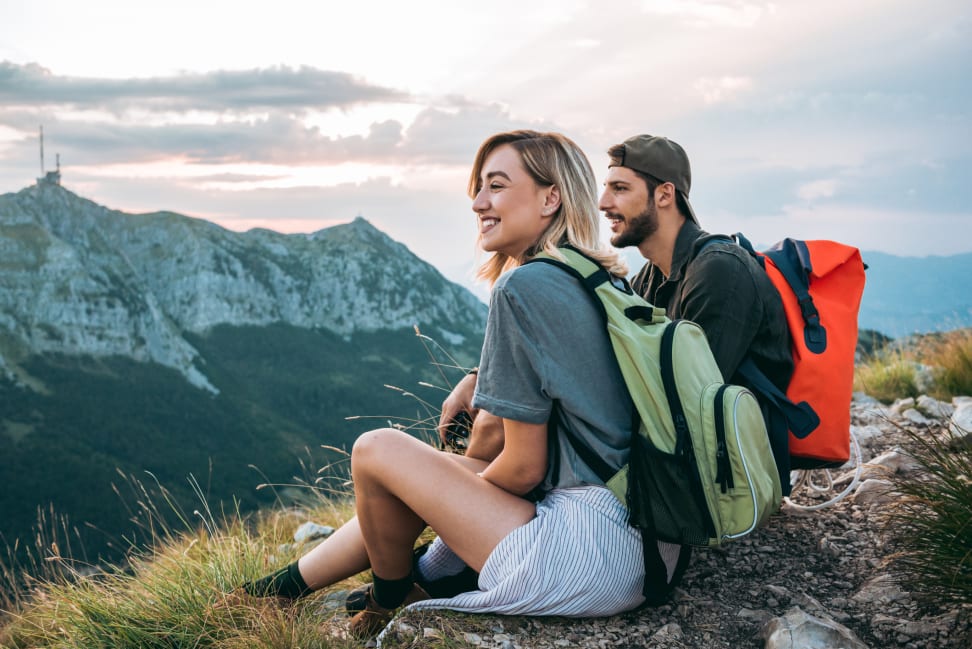 — Recommendations are independently chosen by Reviewed’s editors. Purchases you make through our links may earn us a commission.
— Recommendations are independently chosen by Reviewed’s editors. Purchases you make through our links may earn us a commission.People are turning to unconventional hobbies and new recreational activities as cities quiet and non-essential businesses go on hiatus. Even basic bread-making ingredients, like yeast, can be hard to come by. That’s where open air and the outdoors come in. Just taking a leisurely walk through your neighborhood or along usually bustling suburban streets can provide respite from your home (and office, if you’re currently working from home).
Though many outdoor recreation areas, like numerous National Parks and related facilities, are closed to visitors, local preserves and bike paths may still be open. Check out AllTrails, which has detailed information, and even topographic maps, for trails in your area, or Hike it Baby, a great option for finding family-friendly hiking, providing information on a range of trail characteristics, from accessibility to whether there are water fountains along the way.
Regardless of whether you choose to explore a rural route, a suburban walking path, the city streets, or you head for the hills, here’s what you need for a great afternoon adventure outside.
1. A good water bottle and some snacks
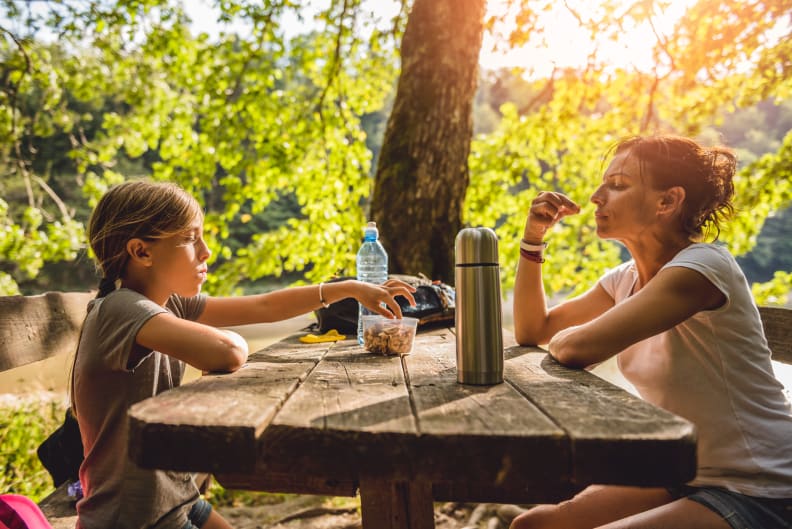
Snacks and water keep you fueled up and ready for more along the trail.
Hydration is always important, and when you’re outdoors being active, it’s even more imperative to drink water. If you’re planning on just a short jaunt under an hour, you can get away with a small bottle of, say, 24 ounces. But if you intend to while away an afternoon outside, a big, but lightweight, water bottle is essential.
A basic plastic water bottle, like a Nalgene will serve you well for hiking. Though it won’t retain cold like our favorite insulated bottles, it comes in at a fraction of the weight, at just 6 ounces empty, so your pack won't be too heavy.
As for snacks, the possibilities are practically endless. Choose foods that have some salt (especially if you tend to sweat), and offer quick-digesting carbs to give you an energy boost as well as some protein and fat to keep you going for however long a haul you have planned. Eat small amounts at regular intervals to keep your body fueled. Classic trailside munchies include fruit snacks, trail mix, fresh fruit and vegetables, and energy bars.
Get the Nalgene Wide Mouth 32oz Water Bottle for $10.95
2. Versatile jackets and pants for any weather

The Patagonia Houdini Jacket packs into a tiny sleeve, making it easy to stow when not in use.
If you’re in Florida, Southern California, or other warm areas, spring might feel similar to the rest of the year. But for people living in chillier places, layering is a great way to negotiate nippy spring mornings followed by warm, sunny afternoons.
Even on warmer days, hikers should pack a lightweight windbreaker or fleece jacket (whichever is appropriate for your location). Adjusting your layers to the weather helps keep you warm when it’s chilly, and allows you to stay cool and dry if the day heats up. Some lightweight shells even pack into small pouches, like the Patagonia Houdini jacket, which comes in men’s and women’s sizes. This jacket blocks wind and has a “durable water-repellent coating” that can keep you dry and warm in case of an unexpected shower.
In terms of pants, convertible zip-offs offer the option to change to shorts midday. The Kühl Liberator Pant in men’s sizes is well reviewed, and the REI Co-op Sahara Convertible Pant is a solid option in women’s sizes.
- Get the Men’s Patagonia Houdini jacket at REI starting at $69.29
- Get the Women’s Patagonia Houdini jacket at REI starting at $69.29
- Get the Men’s Kühl Liberator pant at Kühl for $95
- Get the Women’s REI Co-op Convertible Pants at REI for $69.95
3. Sweat-wicking base layers so you stay comfortable as you get moving
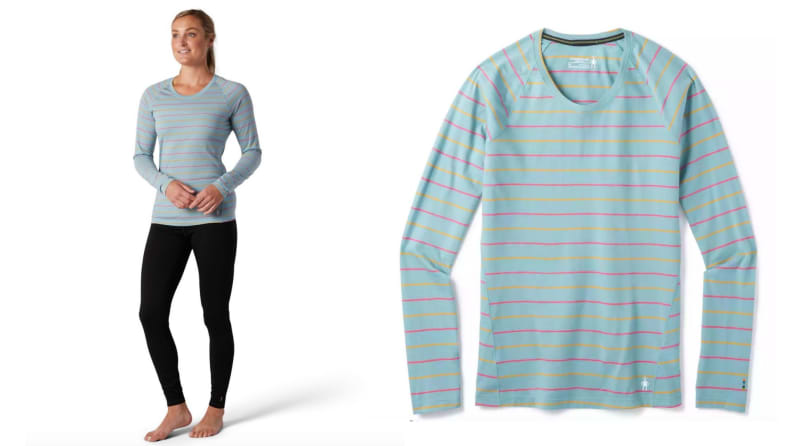
The Smartwool Merino 150 base layer line is breathable and sweat wicking.
Base layers are the clothing you wear closest to your skin, and the main purpose they serve is to whisk away sweat from your body to keep you from feeling soggy or chafed as your activity level increases, There is a spectrum of base layer options, but it’s best to avoid cotton—rather than wicking sweat away, cotton tends to absorb it. Fortunately, many other fabrics work well as base layers, from other natural materials such as merino wool and silk, to synthetics, including polyester. After picking a fabric that suits you, consider fit. By definition, base layers should fit close to the skin but not so tightly they constrict.
Base layers also come in a variety of insulation levels as well as clothing types, giving you lots of options. The Smartwool Merino Base Layers come in weights from 150 (light) to 250 (moderate), and in styles from tank tops to long-sleeve shirts and leggings.
4. A pair of good shoes fit for hiking and sweat-wicking socks for comfort
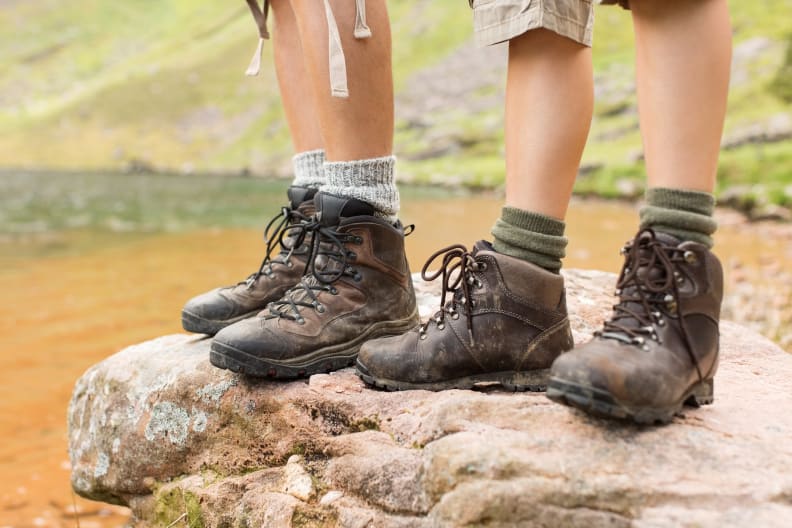
Shoes and socks can make or break a day on the trail.
On the daily, especially when most of us are putting on our slippers to go to “work,” it’s easy to forget how important a good pair of shoes and socks are when you hit the road or trail. Bad shoes can ruin a well planned day of hiking if each step is blister-inducing.
Merrell offers a range of shoes that are good for hiking, without being as bulky as traditional hiking boots. The Moab Ventilator is well reviewed by customers and available in men’s and women’s sizes.
In a pinch, a good pair of running or other athletic shoes should be fine for a casual stroll, but be sure you have a decent pair of sweat-wicking socks. These provide additional padding for your feet, give you some protection from blisters, and keep your toes from getting chilled if (or when) your feet sweat. Smartwool sells wool-blend socks in men’s sizes and women’s sizes that do the trick.
- Get Men’s Merrell Moab 2 Vent Hiking Shoe on Zappos for $99.95
- Get Women’s Merrell Moab 2 Vent Hiking Shoe on Zappos for $99.95
- Get Men’s Smartwool Medium Crew Sock at REI for $19.95
- Get Women’s Smartwool Hiking Socks at REI for $19.95
5. Sunscreen
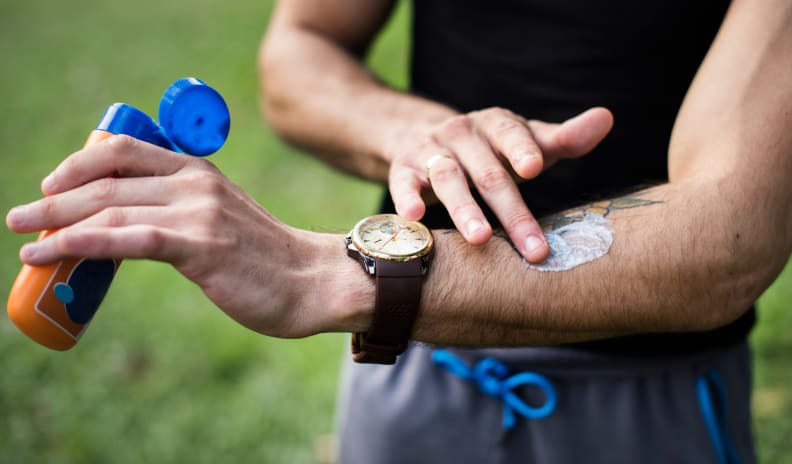
Sunscreen is integral to protecting your skin from harmful UV rays while outside.
Sunscreen is a hiking—and everyday—essential. Even on cloudy days, up to 80 percent of the sun’s harmful UV rays can reach your skin.
Experts recommend using sunscreen that’s SPF 30 or above and is labeled “broad spectrum,” meaning you’ll be protected from both UVA and UVB rays. There are numerous brands and options to choose from, but one key consideration is simply whether you like the sunscreen. If you don’t, you’re less likely to use it.
That said, there’s something for everyone on the sunscreen market. Supergoop claims to be moisturizing, while Neutrogena carries a variety of different types (such as Pure and Free Baby, and Ultra-Sheer Dry Touch sunscreens) at affordable prices.
Once you have a bottle, be sure to put it on before you even head outside—it takes at least 15 minutes for sunscreen to sink in. And if you’ll be out for an extended period (or you expect to be sweating a lot), bring the tube along so you can reapply every two hours.
- Get SuperGoop on Amazon starting at $22
- Get Neutrogena Ultra Sheer Dry Touch Sunscreen on Neutrogena for $11.99
6. A hat and sunglasses to protect your face and eyes
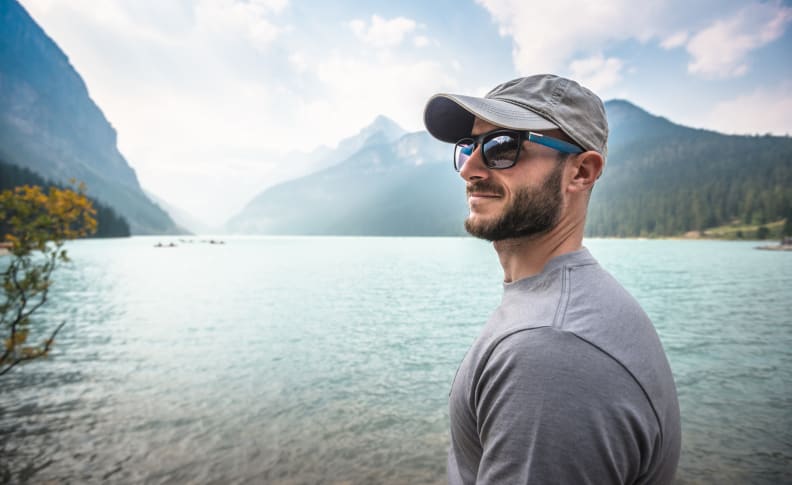
Sunglasses and hats are a great way to protect your face, and eyes, from the sun's harmful rays.
Hats and sunglasses are often worn for the sake of fashion, but they're also important for protecting your face and eyes from the sun. Experts recommend looking for a pair of sunglasses that block 99 to 100 percent of UVA and UVB rays, to prevent damage to the skin of your eyelid, cornea, and other parts of your eye. These Sunski sunglasses provide full UV protection—and come in three lens colors in an on-trend rounded tortoiseshell frame.
Wide-brimmed hats are the most effective for keeping your head and neck protected from UV’s reach. Bucket hats don’t have a huge brim, but they’re better than baseball caps, and, in a wild feat, are even trendy. If that’s not your taste, wide-brimmed straw hats are another option.
- Get Sunski sunglasses at REI for $58
- Get the Oversize Bucket Hat from Nordstrom for $21
- Get the Textured Summer Straw Hat from J.Crew for $34.50
7. A daypack or waist pack to carry your essentials

A good daypack keeps your hands free while giving you space to carry the basics for a day of hiking.
In case you hadn't noticed, there’s plenty to carry when you go hiking, from snacks to water, and even pant legs if you choose zip-offs, so you’ll want a place to stash your stuff that keeps your hands free.
Daypacks are a spacious but lightweight option. The popular Daylite Plus pack by Osprey weighs just over a pound, but has a 20-liter capacity, meaning it will fit even a laptop (not that you should bring it along). For hiking, it will easily carry your essentials plus any extra layers.
Waist packs also come in a variety of shapes and sizes, and may be preferable to a backpack if you just want something small, especially for shorter jaunts. For frequent hikers, something like the Osprey Talon Hydration Pack, which includes bottles to bring along 40 ounces of water, might be a good bet. For a simple, classic waist pack, check out Kavu’s Spectator Waistpack, which comes in a variety of patterns and colors and has two zippered pockets and can carry your wallet, phone, keys, and sunglasses. But if you go for a smaller waist pack, don’t forget a water bottle.
- Get the Osprey Daylite Plus Pack at REI for $65
- Get the Osprey Talon Hydration Pack on Backcountry for $74.95
- Get the Kavu Spectator Waistpack on Backcountry for $18.71
8. A few first-aid items (just in case)
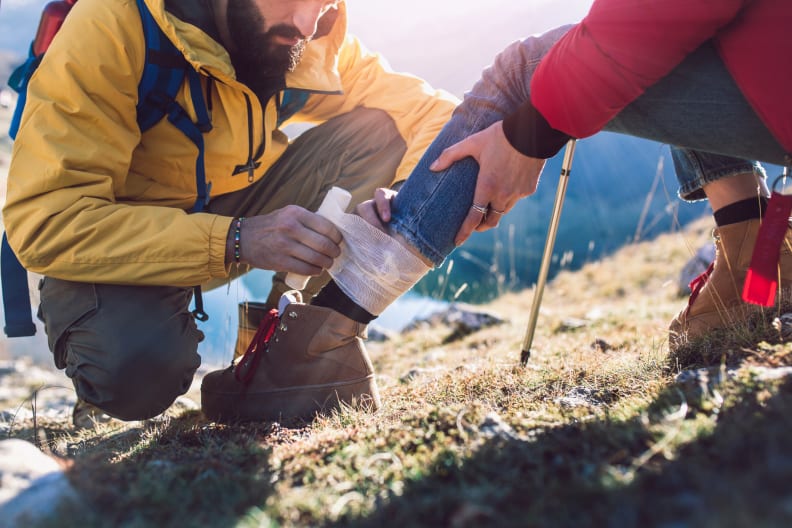
Keep a handful first aid basics—like bandages and antibiotic ointment—in your daypack or waist pack.
From rocks to tree roots, there are plenty of things to trip on when you’re hiking trails, or even on a rough shoulder along the side of a road. That’s why it’s a great idea to bring a first-aid kit along with you.
The best part is: You can probably assemble most of what you need right at home. Must-have items include: bandaging supplies, antiseptic wipes, and antibiotic ointment. Just raid the medicine cabinet, and throw the first aid items you find into a zipper-topped plastic bag. Of course, you can also pick up a pre-made kit designed specifically for hikers.
9. An external power bank for your phone
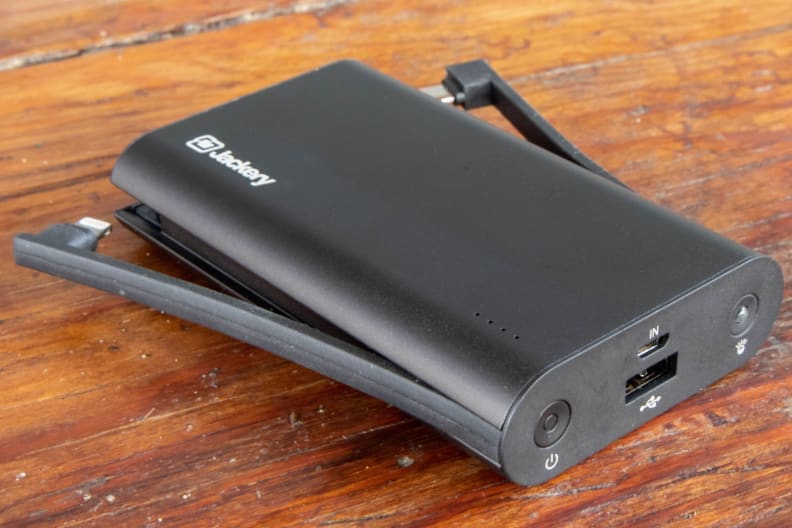
An external charger is a great way to keep your phone juiced up while you're on the move.
It’s a solid idea to look at trail maps (or carry one with you) before heading into the wilderness, and take a basic compass to help you keep your bearings. Relying on your phone’s map app is risky, as you can lose reception in remote areas. But if you are going on a hike you’re familiar with, or just planning on using your phone for lots of Instagram-worthy pics, it’s a good idea to have some extra juice on hand in the form of an external battery pack.
We like the Jackery Bolt 10050mAh Power Bank that comes with built-in cables for lightning and microUSB charging. In our testing, this power bank fully charged an iPhone XR three times. If you’re looking for a power bank that supports newer Androids that use a USB-C connector, check out the Mophie Powerstation PD, which allows users to plug in their own charging cables.
- Get the Jackery Bolt 10050mAh Power Bank at Jackery.com for $32.99
- Get the Mophie Powerstation from Walmart for $66.90
10. Bug spray—especially if you’re going into the woods
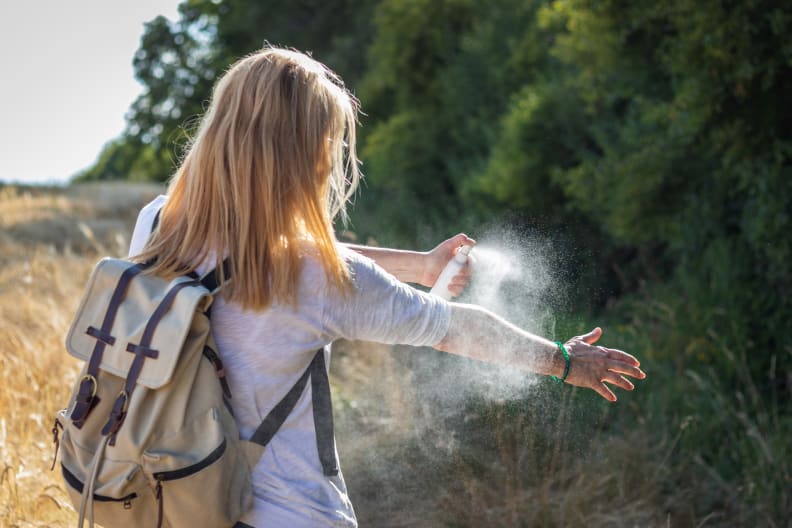
Bug spray helps keep pesky insects off of you so you can focus on the trail, rather than an itch.
From no-see-ums to ticks to, and of course, mosquitoes, there are plenty of biting insects you want to avoid. To keep your skin protected and your pack light, grab a travel-size, one-ounce bottle of Off’s Deep Woods bug repellent, which is plenty for day trips. The spray claims to work for up to 10 hours, so if you really don’t want to carry anything extra, spritz yourself before locking the car, and leave the bottle in the trunk.
The product experts at Reviewed have all your shopping needs covered. Follow Reviewed on Facebook, Twitter, and Instagram for the latest deals, product reviews, and more.
Prices were accurate at the time this article was published but may change over time.
